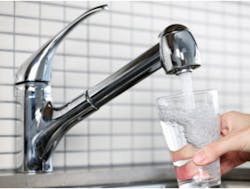DUNCAN, OK, AUG 11, 2017 -- The National Rural Water Association, the largest community-based drinking waterutility organization in the country, praises a July 24, 2017, U.S. Environmental Protection Agency policy to reestablish on-site assistance to the country's over 46,000 small community drinking water utilities to help them comply with federal environmental regulations.
"Small and rural communities have the very important public responsibility of complying with all applicable federal regulations and for supplying the public with safe drinking water and sanitation every second of every day," said Mike Keegan, NRWA Policy Analyst. "Most U.S. water utilities are small: 91% of the country's 50,366 drinking water supplies serve communities with fewer than 10,000 persons. These small and rural communities rely on on-site technical assistance to operate their drinking water and wastewater systems responsibly, in compliance with myriad federal regulations and avoiding EPA fines. Small communities want to ensure quality water and stay in compliance – on-site technical assistance provides them the shared technical resources to do it. We appreciate Administrator Scott Pruitt's new attitude to prioritize the policies that will result in a dramatic and measurable improvement in drinking water safety and compliance in rural America."
EPA's recent decision directs the agency to fund technical assistance through the Grassroots Rural and Small Community Water Systems Assistance Act (PL 114-98), which was enacted on December 11, 2015. This is an important change in EPA policy; to reestablish "full-time" on-site-technicians that were eliminated in 2012 when Congress gave EPA discretion over the operation of the program.
On-site technicians are water treatment and EPA compliance experts that provide roving training and technical assistance to small and rural communities in need. This form of assistance is so effective because the technician can travel to communities to work with their unique treatment system and to personally educate the operations specialists, managers, mayors or other local officials. This level of assistance can only be provided by full time technicians, available to assist communities when they are in need, including nights, weekends and after natural disasters.
Five U.S. Senators wrote a letter encouraging Administer Pruitt to utilize the Grassroots Rural and Small Community Water Systems Assistance Act. Senators Barrasso (WY), Heitkamp (ND), Enzi (WY), Duckworth (IL) and Boozman (AR) wrote:
"On-site technical assistance can equip small and rural communities with the resources they need to provide safe water to residents and businesses while also meeting drinking water standards. We believe this assistance is most effective when it comes from a trusted individual who is willing to travel directly to the community, has technical expertise to remedy the specific issue with existing treatment and infrastructure, and can be available on-site at any time. In December 2015, Congress unanimously passed and the president signed the Grassroots Rural and Small Community Water Systems Assistance Act, which directs the EPA to provide on-site technical assistance in a manner that is most effective to small and rural communities. By following the authorities under the Act, we are hopeful on-site technical assistance can be reestablished in our states and ultimately make the program more effective and easier for the EPA to implement."
The new EPA policy should result in the return of two on-site technicians in each state. These technicians will provide critical support to rural and small communities.



